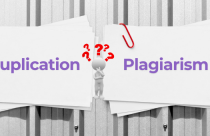Why You Should Not Submit Your Article to More than One Journal!

You have an article ready to go and you’re anxious to get it published. You know that if you submit to one journal, it could potentially take over a year for it to be published. And, even if it is rejected, you might not know for months. Why not increase your chances of a more timely success by submitting the article to more than one journal? This may sound like a very good idea, however, DON’T DO IT!
Aside from plagiarism, submitting to more than one journal at a time might be one of the worst possible academic sins that a researcher can commit. It may not be obvious why that’s the case, so read on, find out. In addition, no matter what, only submit to one journal at a time.
Don’t Drive the Editor Mad
Let’s assume that you have submitted your manuscript to three different journals at the same time. It’s a great article and 8 months later, you hear from all three journals stating that they would like to publish your article. With this in mind, you now have to inform two editors that you’re not interested in publishing in their journal. This is bad for a number of reasons in itself. Firstly, it is insulting to inform the journal editor that you’ve chosen another journal over his or hers. They might probably remember this slight.
Secondly, by the time you inform the editor of your decision to not publish in their journal, they might have already planned most, if not all, of that particular journal issue. This means that they now have to go back and re-plan the entire thing.
Moreover, editors don’t simply shortlist the first half dozen articles they receive. They balance the various journal issues considering a number of factors like different themes, methodologies, established scholars and younger scholars. This is a complicated process and now you’re forcing them to do it twice.
Legal and Moral Issues
Furthermore, there are also legal issues involved. Once the article is accepted, or shortly thereafter, most journals then own the copyright to the article. This can result in quite a difficult situation if you have given the copyrights to more than one journal.
Finally, there is also an ethical angle when submitting to multiple journals. Editors are usually from academics and have separate full-timeme careers, in addition to their editorship. Thus, if you take up their time unnecessarily, that’s less time they have to teach, do their own research and writing, or read someone else’s submission.
More than just the editor, though, you should be concerned about the outside readers. The top researchers in your field are generally asked to peer review article submissions frequently and they often don’t have the time to review all of them. This means that editors then have to find other qualified peers to review the paper. If an editor goes back to one reviewer too much, then that reviewer will certainly begin to turn the editor down.
The circle of available reviewers is very small and editors often end up asking the same reviewers over and over again. Reviews are mostly double-blind (neither the author nor the reviewer know who each other are). Therefore, if you submit to two or more journals, you are wasting the editors and reviewers valuable time that could then go to reviewing a manuscript.
To sum up, submitting to more than one journal at a time is rude, will potentially put you in a bad legal situation, and wastes the time of some very busy people. That’s why when people who do this are discovered, they are often banned from the journals they submitted to for life. It also speaks poorly about your character. Instead, be patient. If your work is good, it will eventually be published. In the meantime, start working on your next article.
Did you ever consider submitting your article to more than one journal that you shortlisted? Let us know in the comments below!











Thank you for the nice explanation!
However, the other side of the coin is that it is unethical and immoral to withhold data from the scientific community, especially with regard to research into cancer, AIDS, disease and other fields where timely release could save lives. This is worth inconveniencing two or three academics somewhere who are dragging their feet reviewing a paper.
As an academician these are some of my experiences below:
1. One I have submitted a paper and I have asked the latest situation of this paper 9 months later after submission. The editor said they had forgotten to send it to reviewers. Waste of 9 months.
2. The editor said “it is out of scope” 6 months later after submission. Waste of 6 months.
3. The main editor said “Reject: because we couldn’t find a sub editor for your manuscript” 4 months later after submission. Waste of 6 months.
4. The main editor just said “Reject” after 3 months without saying nothing. Waste of 6 months.
Well, are those things are ethical? Why are you concentrating only on authors? Say something more to the editors.